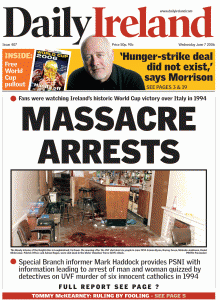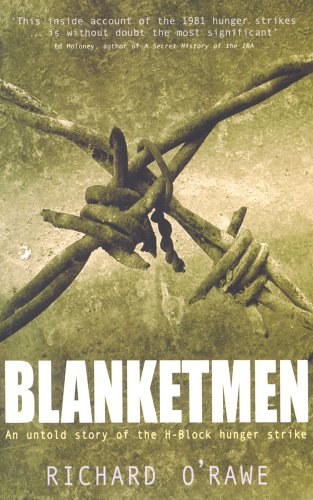Richard O’Rawe, PSF, and Events in 1981
“It only becomes the truth when it is officially denied.”
Gerard Foster, The Blanket • 8 July 2006
I imagine from the title of this article it would be natural to think I am writing about O’Rawes’ book, Blanketmen. Nothing could be further from the truth. I haven’t even read the book, though no doubt I will eventually get around to getting a copy of it.
I am more interested in the Provisional Movements’ Leadership’s (PML) reaction to the book and that of a few others, like Danny Morrison. I had, of course, heard about O’Rawes’ claims, but felt that they were only his opinions and he would have no way of backing them up. It was a non-starter and people would soon forget about his claims that the PML outside the prison let the last 6 Hunger Strikers, including 2 INLA Volunteers, die to promote their own political agenda. Let’s face it, this claim was so serious I did not believe it; I was wondering what agenda O’Rawe was working to, and the release of the book coming up to the 25th anniversary of the Hunger Strikers deaths smacked of commercialism.
Read the rest of this entry »
Salvaging History from Deceit
Some disguised falsehoods represent the truth so well, that it would be bad judgement not to be deceived by them
– Francois de La Rouchefoucauld
Forum Magazine Editorial • June/July 2006
Throughout February 2005 the airwaves and print columns were dominated by the gangland-style murder of Robert McCartney. Two months into Sinn Fein’s centenary celebrations, party spokespersons had hoped to be questioned about “the legacy of one-hundred years of resistance”. Instead they riggled like eels under a sustained media inquisition and were haunted by the ubiquitous image of the McCartney sisters, a group of articulate young women whose decency and courage could not be dismissed as hooey or yet another securocrat plot to undermine the peace.
Later that same February, UTV commissioned a report on a controversial new book written by Richard O’Rawe. Although few would have guessed it at the time, Blanketmen was about to radically alter the conventional republican perception of the 1981 hunger strike.
Read the rest of this entry »
* See also Expanded Timeline 29 June – 12 July 1981

Morrison: Hunger strike deal didn’t exist
Daily Ireland
Danny Morrison
07/06/2006
In a forthcoming BBC documentary Richard O’Rawe once again will be claiming that the republican leadership rejected a deal from the British government shortly before the death of Joe McDonnell on July 8th 1981. Richard is a former blanket man and PRO in the H-Blocks. Whilst in jail Richard never raised his claims with the leadership in prison or the leadership outside. After Richard’s release he worked with me in the Republican Press Centre for a year and never mentioned the allegations he now makes.
Read the rest of this entry »
Tragic period clouded by ‘set of proposals’
(Jim Gibney, Irish News)
The protest for political status in Armagh Women’s prison and the H-Blocks of Long Kesh lasted for five years between September 1976 and October 1981.
At no time before the first hunger strike in October 1980 did the British government try to end the protest by any means other than brutalising and degrading the prisoners.
The first hunger strike involved seven men in the H-Blocks and three women in Armagh jail.
It lasted 53 days.
Read the rest of this entry »

The Conflict Encapsulated
Blanketmen – An untold story of the H-Block hunger strike
By Richard O’Rawe
Book Review
David Adams • The Other View, August 2005
In Blanketmen, Richard O’Rawe claims the IRA leadership in the Maze Prison was prepared to accept a substantive offer from the British Government that would have brought an early end to the 1981 hunger strike.
Supposedly, that offer was made before a fifth hunger-striker died – Joe McDonnell – but the IRA Army Council overruled the prison leadership and the strike continued.
Read the rest of this entry »

A Salute to Comrades
Book Review
Dolours Price, The Blanket • 18 May 2005
After reading ‘Ten Men Dead’ I swore that I would never again read about the Hunger Strike of 1981. I cried at every page and my husband eventually hid the book. I bought another.
My levels of sadness rose at the same rate as my levels of anger. The targets for my anger were the usual ones: those identified by the Republican Leadership as responsible for the death of Bobby Sands and his comrades. Top of the list was Margaret Thatcher, then came busybody priests, political opponents, an uncaring Free-State Government and more and more.
Hunger-striking, the last resort of the brutalised political prisoner. The ultimate weapon, one’s own body. As a Republican I have always maintained that just as I could not be ordered to undertake a Hunger-Strike, then the control and ultimate decision as to where that hunger-strike might lead was also a matter for myself, the individual prisoner. That is not to say that guidance from comrades and particularly the leadership of my movement would at all times be of paramount importance in where that Strike would end for me, be that living or dying.
Read the rest of this entry »
A Spartan’s Story
Anthony McIntyre • Fourthwrite

Richard O’Rawe has come out from under a blanket of political and literary obscurity to pen arguably the finest book crafted by any living former republican prisoner. With no shortage of good authors, the competition has been formidable; Pat Magee, Laurence McKeown and Ronan Bennett to name but three. Blanketmen is the end product of three years writing. It is also the only logical terminus for its author to arrive at after two decades of internal turmoil resulting from the H-Block blanket protest and subsequent hunger strikes. Either he brought his journey to an end or he could circle endlessly around the totem of established wisdom, shouldering with him the baggage others, in his view, had expected him to carry in order to spare themselves unnecessary burden.
To write this book O’Rawe must have drawn on the depths of reserve that made him one of the H-Blocks’ 300 Spartans. He is aware of the history of threats and violence against those not of the dominant party persuasion in West Belfast where he lives. For all the put-downs that he sprang this book on an unsuspecting republican community, O’Rawe has revealed to Fourthwrite that over a year ago a senior figure in the republican hierarchy paid a brace of visits to his home making inquiries about it. Despite current allegations from that hierarchy that O’Rawe did not inform the families of dead hunger strikers of his decision to commit his reflections to paper, the senior republican was concerned only about the potential discomfort that Gerry Adams might face. The families were never mentioned.
Read the rest of this entry »

A Must Read
To fully appreciate the controversary surrounding the book, it must be read
BLANKETMEN
An Untold Story of the H-Block Hunger Strike
RICHARD O’RAWE, New Island Press
Book Review
Mick Hall, The Blanket • 18 March 2005
I once asked a former member of the British Army Intelligence Corp if there was any substance in the British Government’s fears if they announced their withdrawal from the Six Counties the Loyalist Paramilitary’s would conduct an OAS* type campaign in England. He replied he could not see this happening, as the Loyalist terror groups, the UDA, LVF and the UVF, unlike the Provisional Irish Republican Army, simply did not have the stamina necessary to conduct a bombing campaign on the British mainland. The book Blanketmen, An Untold Story of the H-block Hunger Strike written by former Blanketman Richard O’Rawe, more than adequately answers the question what gave the Provos such tenacious stamina to fight a thirty odd year war against not only one of the world’s major military powers, but also the most experienced army in combating insurgencies.
I would appeal to all those who have been warned off reading this book by the heavy handed attempt by the Provisional Republican Movement apparatchiks to discredit Richard O’Rawe to place any doubts that may have been raised in their minds about him to one side and make their own mind upon reading the book. By so doing I guarantee they will come away with the belief that the aforementioned attack on O’Rawe was sadly yet another example of the PRM leadership over-reacting and scoring, not for the first time of late, an own goal. After all, if Irish Republicanism means anything, it is an ability to think for ourselves and thus make our own decisions; it is not an accident that soldiers of O’glaigh na hEireann are called Volunteers.
Read the rest of this entry »
H-Block hypocrisy
Village
Saturday, 12 March 2005
Richard O’Rawe saw ten of his fellow hunger strikers die in the H-Blocks in 1981. In a new book, he claims that the IRA leadership rejected a British offer that could have ended the hunger strikes. Suzanne Breen reports
West Belfast is a small world packed with big emotions. Richard O’Rawe lives just across the road from Milltown Cemetery where three of the hunger strikers are buried.
Most mornings, he visits the republican plot where Bobby Sands, Joe McDonnell and Kieran Doherty lie. “It’s desperate, just desperate,” he says. “I don’t need to go there to remember them because they never go away.”
Gerry Adams lives in the next street from O’Rawe, Danny Morrison is just around the corner. Three men, all living in the shadow of Milltown and the hunger strike.
Until recently, republicans were united on the 1981 fast. The official – and unanimously accepted – line was that a callous British government allowed ten men to die and nothing, apart from calling-off the protest in humiliation, could have saved them.
Read the rest of this entry »
Hunger strikers wanted more than vague promises
(by Danny Morrison, Irish Times)
The claim that the IRA’s army council was responsible for prolonging the hunger strikes is wrong, writes Danny Morrison.
Your columnist Fintan O’Toole (March 1st) readily accepts Richard O’Rawe’s claim in his new book Blanketmen that the IRA army council was to blame for six of the 10 hunger-strike deaths by refusing a deal from the British government.
The 1981 hunger strike was a direct result of the 1980 hunger strike. The British government had said that it would not act under duress but would respond with a progressive and liberal prison regime once it ended. The prisoners called off the fast to save the life of Seán McKenna.
However, the British immediately reneged on their promises. Because of this duplicity the hunger strikers of 1981 were adamant that any deal must be copperfastened.
Read the rest of this entry »
A Blanketman Still Fighting To Be Heard
Anthony McIntyre, The Blanket • 4 March 2005
 This time last week, the name Richard O’Rawe meant little to most people in Ireland. He has no reputation as a political scoundrel, nor has he acquired the notoriety that comes with taking the life of a fellow human being. Although a republican from childhood, there are no photographs of him with a tongue sticking through each cheek, or his nose a foot long. He is not a prominent writer … yet. So there was no particular reason for his name to have generated widespread recognition.
This time last week, the name Richard O’Rawe meant little to most people in Ireland. He has no reputation as a political scoundrel, nor has he acquired the notoriety that comes with taking the life of a fellow human being. Although a republican from childhood, there are no photographs of him with a tongue sticking through each cheek, or his nose a foot long. He is not a prominent writer … yet. So there was no particular reason for his name to have generated widespread recognition.
Less than a week after hitting the headlines via one of the main Sunday newspapers, he probably feels the gravity in his world has gone down the plughole. Throughout republican heartlands the central contention in his book Blanketmen is being discussed and debated, frequently in heated manner. It is talked about in bars, living rooms and taxis. Interest in the broadcast and print media has not waned. Opponents have reviled him and friends have worried for his safety.
Read the rest of this entry »
Hunger Strikers Story Brought to Book
From Daily Ireland, 2 March 2005
Danny Morrison
I got a phone call from the ‘Sunday Times’ last Saturday.
“Do you know Richard O’Rawe,” the journalist asked. “He mentions you in a new book he has brought out.”
That surprised me because I had waved to Richard a few days earlier when I crossed the road just below his house and would have thought he would have given me the good news – and a free copy. About four years ago he came to me and told me he was writing a book about growing up in West Belfast and could I give him advice. We met twice, once in each other’s homes. What I read was quite funny and reminiscent of my own youth. Richard said that an agent had offered to publish his book for several thousand pounds. I told him not to go down that road – which is called vanity publishing – and I gave him the names of some literary scouts and publishers. But I don’t think he had any luck. It is a tough circle to break into.
The journalist told me that his paper was serialising Richard’s book, ‘Blanketmen’, and proceeded to read out to me an accompanying feature: ‘Ireland: The men who died for nothing. Former Maze inmate Richard O’Rawe was at the heart of the 1980s hunger strike drama. His new book lays the blame for six of the 10 deaths firmly on his IRA army council masters.’
I was astonished. Richard was saying that there was a deal offered to the hunger strikers by the British before Joe McDonnell died but that the army council rejected it. The journalist quoted from the book: “No matter which way one views it, the outside leadership alone, not the prison leadership, took the decision to play brinkmanship with Joe McDonnell’s life. If Bik and I had had our way, Joe and the five comrades who followed him to the grave would be alive today.”
Read the rest of this entry »




 This time last week, the name Richard O’Rawe meant little to most people in Ireland. He has no reputation as a political scoundrel, nor has he acquired the notoriety that comes with taking the life of a fellow human being. Although a republican from childhood, there are no photographs of him with a tongue sticking through each cheek, or his nose a foot long. He is not a prominent writer … yet. So there was no particular reason for his name to have generated widespread recognition.
This time last week, the name Richard O’Rawe meant little to most people in Ireland. He has no reputation as a political scoundrel, nor has he acquired the notoriety that comes with taking the life of a fellow human being. Although a republican from childhood, there are no photographs of him with a tongue sticking through each cheek, or his nose a foot long. He is not a prominent writer … yet. So there was no particular reason for his name to have generated widespread recognition. It has withstood the blows of a million years, and will do so to the end.
It has withstood the blows of a million years, and will do so to the end.